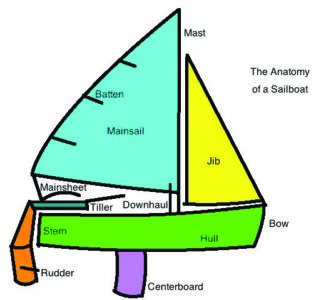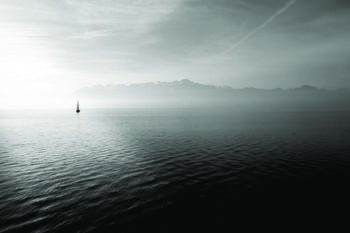What’s This Stuff Called Grace?

Stephen Sparrow
Grace is offered to us by God – it is the help offered with which we are meant to co-operate to ensure our salvation.
God has not given all of us an equal share of grace – in fact the grace of God manifests itself in many and varied ways.
Anyway, we have inside us a receiver which can channel grace into us and help us make use of it.

An analogy: suppose you were to awake from a deep sleep to find yourself adrift at sea in a small sailing dinghy. There’s a wind blowing and waves are buffeting your craft. You are frightened but you look around for some idea on how save to yourself since you can only see land in the direction the wind is coming from, which means your dinghy is being blown further and further from it. The dinghy has a mast and the sail is crumpled on the floor of the cockpit, together with various ropes, shackles and other tackle. You look around to see what else is in the boat – food, maybe, or water, but then you spot a small instruction book with diagrams, so you open it. In spite of the boat’s up and downing and the possibility of motion sickness you get things figured out fairly quickly – you discover the purpose of the main halyard – to haul the sail up the mast; and from the diagram, you see that you must install the rudder, fit the tiller, lower the centreboard – and you do those things – not all that complicated really, and, of course, you quickly learn to duck your head when the boom swings over.
 So you grab the tiller, pull the boom in using a rope called the mainsheet and the sail fills and the boat starts moving. It also starts to lean over – alarmingly, as if it is going to capsize, so you sit up on the high side – the side called the gunwale – and this positioning of your weight holds the dinghy level, and now, with the boat actually moving, we’re away laughing, as they say. You find you can steer the boat nearly directly into the wind – move against it – sailors call it beating into the wind.
So you grab the tiller, pull the boom in using a rope called the mainsheet and the sail fills and the boat starts moving. It also starts to lean over – alarmingly, as if it is going to capsize, so you sit up on the high side – the side called the gunwale – and this positioning of your weight holds the dinghy level, and now, with the boat actually moving, we’re away laughing, as they say. You find you can steer the boat nearly directly into the wind – move against it – sailors call it beating into the wind.
After a while of beating into the wind on an angle, you change the angle and put the boat about, as sailors say, and the boat beats into the wind on a different angle and you notice that the distant land is now getting closer. This zig-zagging into the wind is called tacking – so now we’re getting somewhere, and soon we find ourselves sailing towards the shore and safety – a harbour.
So, there you have it. Grace is everywhere – grace is like the wind, but to co-operate with grace we need to put up our sails, so to speak. If we don’t, we’ll just be blown about hither and yon without ever finding ourselves in a place of safety and security, and that place is the Will of God – we fall in with it by listening to the weather, the direction of the wind – God’s will – to discern what God wants us to be.
Often, we will find other people in floating dinghies, just as we once were, and we should sail near to them to see if they need help. They may be storm-damaged even, and close to sinking, but we don’t haul alongside and laugh at them, or tell them how useless they are or start barking orders at them – well, we might have to bark at them a little at first, especially if they’re in imminent danger of disaster, but immediately after that we can engage them in talking, and presently, they may ask us to help them make progress. At this point we can indicate how they can repair their craft and get it rigged to enable it to find the safe harbour of God’s will.
 Making use of grace is not a one-off sure-fire recipe or strategy. No, we must pause often to look at the weather, work out from which direction the wind is coming so that we can be what God wants us to be – and that can change as we journey through life. We may encounter storms that frighten us, we can run aground on a sand bar or collide with other craft. We can encounter flat calms (no wind) when we seem stuck in one place – seemingly going nowhere; or we can zip along with the wind behind us at an exhilarating speed, but always these phases carry meaning for us and help us to grow spiritually – grow in grace – a growth helped along especially by our willingness to help others cope with difficult weather.
Making use of grace is not a one-off sure-fire recipe or strategy. No, we must pause often to look at the weather, work out from which direction the wind is coming so that we can be what God wants us to be – and that can change as we journey through life. We may encounter storms that frighten us, we can run aground on a sand bar or collide with other craft. We can encounter flat calms (no wind) when we seem stuck in one place – seemingly going nowhere; or we can zip along with the wind behind us at an exhilarating speed, but always these phases carry meaning for us and help us to grow spiritually – grow in grace – a growth helped along especially by our willingness to help others cope with difficult weather.
St Thérèse of Lisieux said she “always wondered why it was that God has his preferences; instead of giving each soul an equal degree of grace”. But as Thérèse was to learn later from a visiting priest, there is more variety in souls than there is in the totality of human faces. We are all different. Nobody leaves this world without leaving some mark somewhere – a footprint maybe – even the child never born can influence us. All of our experiences have collaborated to bring us to this point in life in which we now find ourselves, and grace is always there for us to co-operate with. And, as Catholics, we are especially privileged to be able to access the incredible abundance of grace available through reception of the Sacraments – the Eucharist and Reconciliation to mention just two. The sacraments are like extra sails we can crowd onto our small dinghy – spinnakers, jibs, gaff top sails etc, and with these we can capture even more wind – access more grace and keep any impending spiritual disaster completely at bay, and at the centre of our faith and the source of all grace is the person of Jesus Christ – second person of the Holy Trinity.
How more wonderful this wonderful world would be if everyone kept still for long enough to discern what it is that God wants us to be, enabling us to fall in with the divine plan – how more wonderful indeed – can you imagine that?
 Entries(RSS)
Entries(RSS)